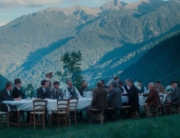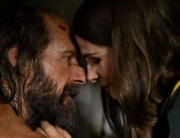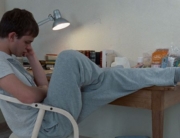The U.S. version of the international Big Brother TV franchise is an anomaly, a moderate summertime ratings hit for CBS and nowhere near its pop culture and ratings dominance around the world. The rules of the show, where the last participant left in the house is the winner, vary from country to country, but the premise stays roughly the same: a voyeuristic feast of the hot and horny exhibitionists living in an isolated studio for weeks on end. The fame for participants has even lasted for more than 15 minutes, launching many a tabloid-ready celebrity in Britain and nude pictorial in Brazil.
In Matteo Garrone’s dark fantasy, the slightly sleazy reality show represents an answered prayer, the last hope for family man Luciano. In his early forties, he wears many hats: a fishmonger by day, a black marketer on the side, and a wedding entertainer on the weekends. It is here he meets Enzo (Raffaele Ferrante), a former Grande Fratello star who now makes money just for showing up at events before a fawning crowd. Luciano takes Enzo’s motto, “Never Give Up,” heartily to the extreme. He auditions for the show’s new season, and is called to the fabled Cinecittà studios for a callback. Luciano’s not the first to assume that he has in his grasp the opportunity of a lifetime, but he quits his jobs, so assured that the producers will call, before he really goes off the deep end.
Saucer-eyed lead actor Ariello Arena looks more than half his age when his face lights up at the mention of Big Brother. His childish enthusiasm could convince you of anything. For his first film role, Arena was chosen from a company of prisoners at the Volterra Detention Center, not unlike the acting ensemble seen in Caesar Must Die. Arena has been in prison for 20 years for a mob-related crime (the charge: “massacre”), and is due to be released in eight years.
But the TV show doesn’t just serve as a convenient vehicle for a send up of the thirst for fame. The script was loosely influenced by the experiences of Garrone’s brother-in-law. Rest assured that there won’t be tension or awkwardness at family gatherings as a result. Garrone has made a more compassionate and empathetic exhumation of Italian life than in his stinging Gomorrah or Primo Amore.
The effect of watching this beautifully crafted and sincere film about desire run amok is virtually hypnotic, thanks to the long gilding takes. The camera circles the characters, whether at a wedding or in a decrepit Neapolitan apartment (yes, with the laundry hanging out to dry). Style is the substance. This is one of the few films that has actually earned the abused label “Fellini-esque,” though without the grotesquerie, mostly because of the brashness and gaudiness splashed on screen. Nevertheless, it has its own strong sense of time and place. Alexandre Desplat’s score adds to the dreamy tone, a lullaby by way of a three-ring circus. (According to Garrone, Desplat has singled out Fellini’s frequent collaborator Nino Rota as his favorite film composer.)
This is not the first film to paint show biz as a surreal paradise or as a substitute for religion (which becomes more explicit as Luciano unravels). Though at 115 minutes, the viewer will likely wake up from this dream intermittently. Even if you have never seen Visconti’s Bellisima or Scorsese’s The King of Comedy, the film’s ideas will be more than vaguely familiar.
Yet Garrone turns to his own bag of tricks to convince the viewer of Luciano’s warped sense of perspective, darting in and out of the everyman’s point of view. The way Garrone plays with perspective, you’ll question what is real and what is illusion. You can’t be blamed if you, too, are convinced that Luciano will inspire a new national catchphrase.







Leave A Comment